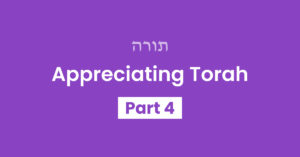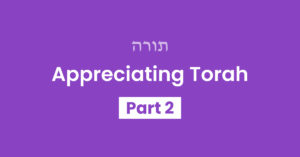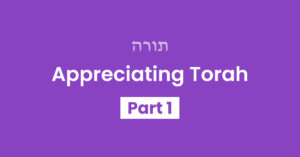In the past few weeks, we have been discussing the value of Torah and why the Torah deserves to be treated with so much honor. First, we explained that the Torah was created even before this world was created, and that the Torah is the “blueprint” for all of Creation. Everything in this world – trees, ants, the moon, and my arm – was created only for the purpose of enabling us to keep the mitzvos of the Torah.
Next, we explained how this concept applies not only to the world as a whole, but to our personal lives, as well. If we see that we were created with difficult parents, challenging children, or weaker intelligence, we can rest assured that these details, too, are part of Hashem’s Master plan for the universe. It’s not a bidi’eved (less-than-ideal) situation that we are living with these difficulties; rather, Hashem specifically created us with these challenges in order to give us powerful opportunities to invest effort in keeping the mitzvos of the Torah – which is, after all, the purpose of Creation.
The Power of Torah Learning
Aside from fulfilling the mitzvos of the Torah, Chazal teach us that even just the act of learning Torah itself is incredibly powerful.
As it says in Pirkei Avos1: “The world stands on 3 things: Torah, Avodah (Service of G-d), and Gemilus Chassadim (Acts of Kindness).”
Not only is Torah one of the three pillars that support the entire world, but the Nefesh HaChaim2 also writes that if even one second would go by when no Jews on earth were learning Torah, then the entire world would collapse and revert back to its original state of nothingness. Every moment that a person learns Torah, he is supporting the entire world!
Every moment that a person learns Torah, he is supporting the entire world!
Even one single Jew has the power to uphold the entire world through his Torah learning. And for this learning, says the Nefesh HaChaim, he will earn tremendous reward, because it is due to his credit that the entire world is being sustained.3
Although this may sound extreme, we can appreciate how it is true based on what we already explained about the centrality of Torah. The Torah was created even before this world ever existed; this entire world exists only for the sake of the Torah. Therefore, we can understand how a person’s involvement in Torah study can uphold the entire universe. When a person learns Torah, he is involving himself in the entire purpose of Creation. The whole world exists for the sake of the Torah that he is learning.
Understanding Ratzon Hashem
When we think of someone sitting and learning Torah, it might be hard to imagine how they are doing something so colossally significant. Why does it matter if they are learning to figure out exactly how many cows to offer as a sacrifice on the 5th day of Sukkos, or whether a specific mixture of wool and linen is considered Shaatnez?
The answer is that when a person learns Torah, he is not just reading a textbook full of information. Rather, he is demonstrating his deep love for Hashem, by showing how much he cares to understand Hashem’s will.4
He is demonstrating his deep love for Hashem, by showing how much he cares to understand Hashem’s will.
Imagine that it’s a few days before Purim and your sister goes out to buy hamantschen from the bakery. Ten minutes after she leaves, you get a call from her on your phone.
“Hi,” she says. “Sorry to bother you, but I was just trying to remember what kind of hamantaschen you like best. They have here apricot, strawberry, poppyseed, and chocolate. Personally, I like them all, but I wanted to know which one you like best so I can make sure to get enough of that kind!”
Your sister could have just picked any kind of hamantaschen to buy, but by asking you which one you like the best, she is demonstrating how much she cares about you. By investing time and effort in trying to understand your preferences – what you like and what you don’t like – she is demonstrating her love for you.
The same is true when a Jew learns Torah. As we explained earlier, the Torah is our guidebook for understanding exactly what Hashem wants. Therefore, every moment that a Jew learns Torah, he is demonstrating his love for Hashem. He is showing how much he cares to find out exactly what Hashem wants. Does Hashem prefer that we put two branches of Aravos in our Lulav, or three? Does Hashem prefer that we say Al Hamichya after eating even a small cookie crumb, or only after a kezayis?
He is showing how much he cares to find out exactly what Hashem wants.
We might not always understand the reasons behind why every mitzvah is important, but the mere act of trying to find out Hashem’s will through learning Torah is our way of showing Hashem how much we care.
This week, let’s spend a little extra time learning Torah. By purposefully increasing the amount of Torah learning that we do, we will be supporting the entire universe and also showing how much we care about fulfilling Hashem’s will – which is, after all, the ultimate purpose of the entire Creation.
| Sources: [1] Pirkei Avos 1:2; [2] Nefesh HaChaim 1:16; [3] Nefesh HaChaim 4:25; [4] See Nefesh HaChaim 4:6-7 |
Your Challenge
Once a day, learn Torah for at least 5 minutes. Before you start to learn, say or think to yourself: “The Torah that I am about to learn is supporting the entire world.”
You can learn any kind of Torah that you like, whether Chumash, Mishnah, Gemara, Halachah, Chofetz Chaim, Pirkei Avos, etc.
Torah Questions
- What reward or result did Hashem promise to Yehoshua if Yehoshua would make sure to never let go of the Torah? (See Yehoshua 1:8)
- According to Tehillim 19:8, what effect do Torah and mitzvos have on a foolish person?
- According to Rashi on Shemos 24:12, all of the 613 mitzvos are included in the ____?
- According to Rashi on Devarim 32:2, in what way is the Torah similar to stormy winds?
- According to Rashi on Yeshayahu 59:21, the Torah will never be forgotten, even when the Jewish people are in _____.
- According to Pirkei Avos 6:5, how many ways are there to acquire Torah?
Questions to Ponder
- Chazal point out that the Torah begins and ends with acts of kindness: At the beginning of the Torah, Hashem made clothing for Adam and Chavah – and at the end of the Torah, Hashem buried Moshe Rabbeinu. Why do you think Chazal felt it was important to point this out? Why do you think Hashem made sure to start and end the Torah with descriptions of His acts of kindness?
- The Zohar says that the Jewish people were exiled from Israel only because of the sin of “bittul Torah” – wasting time from Torah study. Why do you think that wasting time is such a horrible sin that it resulted in our exile? Why wouldn’t it be enough if we kept the mitzvos but just didn’t spend so much time actually learning Torah?
- It says in Pirkei Avos that the “way of Torah” is the following: “Eat bread in salt, drink water in small measures, sleep on the ground, live a life of discomfort, and toil in Torah.” Why do you think this is the “way of Torah”? Why can’t you live a life of Torah and also be more comfortable at the same time?
- At the end of the abovementioned Mishna in Pirkei Avos, it says that if you live such a life, you will be “fortunate in this world,” and it will be “good for you in the next.” We can understand how a life of Torah is good for earning reward in the next world, but how could Chazal say that you will be “fortunate” in this world too? Wouldn’t your life in this world be very uncomfortable?




